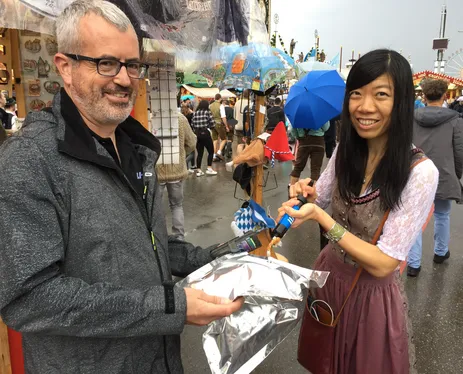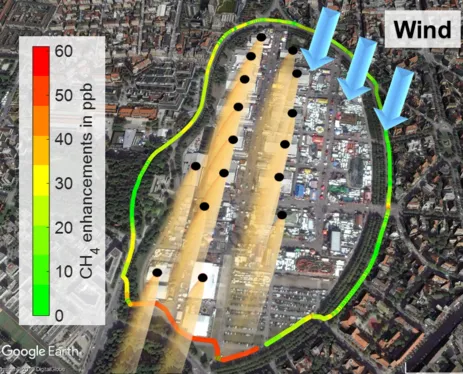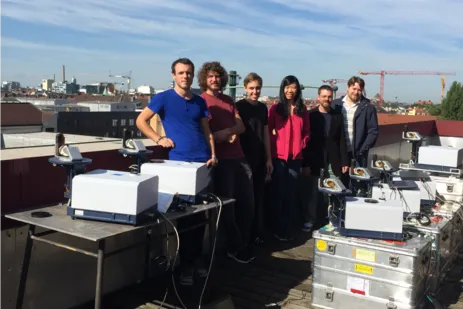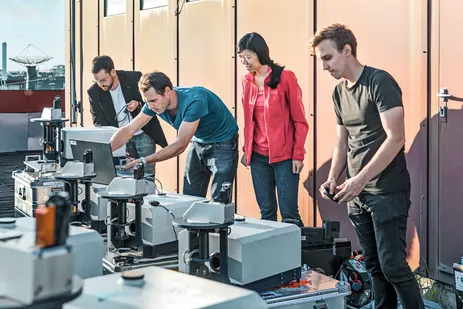- First fully-automated differential column network for measuring GHG emissions tested in Munich. Geophysical Research Abstracts, 2019 more… Full text ( DOI )
- Mesoscale Column Network for Assessing GHG and NOx Emissions in Munich. Geophysical Research Abstracts Vol. 20, EGU2018-10192-2, 2018 more… Full text (mediaTUM)
Methane investigations at Oktoberfest
More Info
In 2018 and 2019, we investigated the greenhouse gas emissions at the Munich Oktoberfest in collaboration with Utrecht University, TNO, Picarro Inc. and Licor Inc. Given that humans are not very big methane emitters, the high amount of methane which was measured in 2017 using differential column measurements is especially intriguing. Therefore, a different reason for those high concentrations must be found.
That’s why, in 2018 and 2019, the researchers led by Professor Jia Chen looked closer into the source attribution. Using the GasScouters as a backpack, the scientists walked and biked around the area of Oktoberfest many times. The result of one measurement round can be seen in the right figure below. On that day there was a constant northeast wind so that the gas molecules were transported to the sourthwestern border of the Oktoberfest area, where the highest concentrations were observed. We have determined the total emission number of Theresienwiese, the daily cycle of emissions as well as the week and weekend variations. We have also determined the isotopic ratios and ethane/methane ratios. From these findings we can draw conclusions about the source origins of the Oktoberfest methane emissions.
The results of the study in 2018 are summarized in a publication (highlight article in Atmospheric Chemistry and Physics, Research Highlight in Nature (Nature 580, p. 169), featured by Science and can be found here.
Chen, J., Dietrich, F., Maazallahi, H., Forstmaier, A., Winkler, D., Hofmann, M. E. G., Denier van der Gon, H., and Röckmann, T.: Methane emissions from the Munich Oktoberfest, Atmos. Chem. Phys., 20, 3683–3696, https://doi.org/10.5194/acp-20-3683-2020, 2020.
Our presentation highlighted at the EGU general assembly 2019 can be found in here.
International Campaign For Assessing Urban GHG and Pollutant Emissions
The majority of anthropogenic greenhouse gas emissions originates from cities, therefore monitoring emissions in cities is essential to fight climate change. Munich sets up an ambitious emission reduction goal to cut CO2 emissions by 10 % every 5 years and be carbon neutral by 2050.
In September and October 2017, an international joint campaign led by Prof. Chen was carried out, to determine the greenhouse gas and NOx emissions in Munich. The partners included Harvard, DLR, KIT, and LMU. The team deployed 6 solar-tracking Fourier transform spectrometers in and around Munich for measuring CO2, CH4 and CO, and 2 MAX-DOAS for measuring NOx.
This campaign is a follow-up of a series of city investigations carried out in US, including Indianapolis and San Francisco Bay Area. We brought 3 spectrometers to the US to jointly measure CO2 and CH4 emissions with our Harvard, Caltech, LANL, and Berkeley colleagues.



